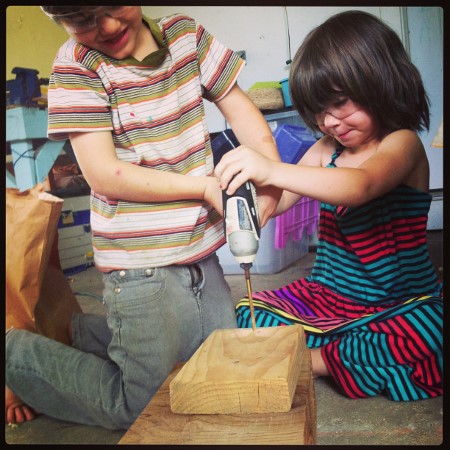On proficiency
/Kami Wilt has been thinking a lot about proficiency lately. She shares her thoughts on the topic in this guest post, her third for Alt Ed Austin. Kami runs—quite proficiently, I might add—the Austin Tinkering School, which now has a second location, on North Lamar.

Proficiency: A high degree of competence or skill; expertise. Synonyms: skill, expertise, experience, accomplishment, competence, mastery, prowess, deftness, dexterity, finesse
I’ve had a sewing machine for several years now—longer than I’d care to admit, because I continue to have a contentious relationship with my machine. I didn’t grow up sewing, and although I took a few sewing classes awhile back, my experiences sewing at home are peppered with frustration and troubleshooting. I can hack it through a small project, but the thought of using it kind of stresses me out. I don't feel like, “Oh, I’ll just sit down and whip that out,” but instead brace myself for the inevitable snarls and hiccups that accompany my sewing experiences.
I don’t know what happened, or what shifted, because I hadn’t even used the machine recently, but this week I had an idea for something I wanted to make, and I just sat down and MADE it. My off-and-on usage over the years had somehow reached the tipping point, and I achieved proficiency. The machine didn’t give me trouble. My project came together more or less the way I had wanted it to. I’m no expert, so maybe saying that I suddenly became proficient on the sewing machine is overstating it a tad, but the feeling that I could use the machine with ease opened me up to all sorts of projects that seemed way out of my range before, and my synapses were firing all over the place.
Of course, I've had this experience with other tools, too. I can remember the mental “click” that happened when using the chop saw changed from anxiety-producing to no big deal, and the possibilities that suddenly opened up when I could make those quick cuts easily. I took a screen printing class a few years ago, yet the screens I made weren’t seeing any action; I still felt like it was something I couldn’t really do on my own. But this summer I wanted the kids in my summer camps to get an Austin Tinkering School t-shirt, and ordering a bunch of preprinted shirts just didn’t seem very tinkery. Now, 84 t-shirts later, I'm feeling pretty fly with that squeegee!
At least for me, a single class usually is not enough to help me break through my mental block with a new tool. It takes a lot of time and floundering and mess-ups, which can be very hard for us results-oriented and failure-averse adults. Kids are so much better at just being interested in the process and persevering as they learn to use a new tool, if we give them that space. At Tinkering School we often see kids sawing through a big, thick two-by-four with a handsaw or working to cut a piece of cord with a pair of scissors, completely absorbed for surprisingly long periods. Sometimes it’s hard to not just step in and do it for them. But we don’t rescue them, because we want them to have that chance to hone their skills—and to be opened up to the multitude of possibilities that mastery of a new tool affords.
When I see a kid suddenly driving in screws by herself, where before she was fumbling and nervous and needed help, I am so psyched that she was able to make the leap from “I can use a drill, but only at Tinkering School” to “I can use a drill. On my own. Any time I have access to one.” That’s a kid who’s more empowered.
Proficiency is key to feeling like we can have an effect on the world around us. We can fix things. We can make things. We move from passivity (“It broke, and now we have to throw it out” or “I have an idea but no idea how to build it, so I never will”) to action and participation. Not only does this society needs all the active participants it can get, but being a part of the Making and the Doing is also a lot more fun!
Kami Wilt









